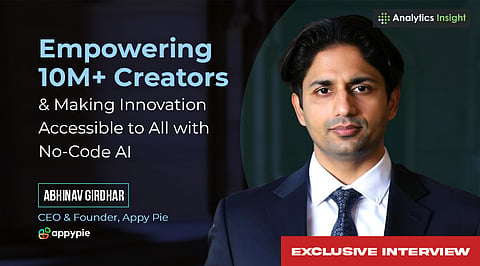Exclusive Interview ‘The Future Belongs to No-Codes with Deep AI Integration,’ Abhinav Girdhar, CEO & Founder, Appy Pie
We live in an era when technology has invaded all aspects of our lives. Every business today needs AI, and no-code platforms are a great way to enable business growth cost-effectively and rapidly. The no-code market for creating apps and other solutions now has a global footprint of 12 million users, with Appy Pie leading it from the front. Appy Pie, a cloud-based app builder, has empowered over 10 million users to create mobile apps and digital assets without writing a single line of code.
In this exclusive interaction, Abhinav Girdhar, CEO & Founder, Appy Pie, shares how, from launching AI-powered tools like Pixel Yatra, Pixel Forge, and Vibeo to navigating scale, trust, and ethics in a competitive market, he is leading the no-code revolution from India to the world.
What inspired the idea behind Appy Pie, and how has the journey been so far? Also, what was the core vision behind launching Pixel Yatra, Pixel Forge, and Vibeo?
We set out with a very ambitious vision to democratise technology. In this endeavour, we wished to empower businesses as well as individuals to build digital properties without any technical expertise or big budgets. Traditionally, a long and tedious process, the creation of digital products is time-consuming and requires technological expertise. This vision to empower anybody who might need digital assets has led to the evolution of a no-code ecosystem that is currently being used by millions of people worldwide.
We recently launched some AI-driven creative tools—Pixel Yatra, Pixel Forge, and Vibeo that are in huge demand. While Pixel Yatra can create stories through AI-generated visuals for businesses, Pixel Forge uses generative AI to simplify images and create assets. Vibeo, on the other hand, makes AI-based video creation accessible and within budget for all. When combined wisely, these will enable digital creativity that is more accessible yet still simple and faster.
Which industries are leading in no-code adoption, and what critical advantage will enterprises miss out on if they don’t make the shift now?
Even as technology is being utilized in every sector, industries such as retail, healthcare, education, and logistics, as well as financial services, are amongst the first ones to adopt no-code adoption. A major reason for this is that these sectors are constantly under pressure to use innovative ways to improve operational efficiency and deliver highly personalised digital experiences. On the other hand, enterprises that hesitate to adopt no-code platforms risk lagging in terms of cost savings, speed, and agility. In fact, the gap between business and IT teams will widen for such businesses. Hence, the no-code solutions will empower different departments to collaborate, build faster solutions, and bridge the gap with the help of accelerated innovation cycles.
As generative AI goes mainstream, how do you see no-code platforms evolving to stay relevant and not be replaced?
We see generative AI as a catalyst for evolution instead of considering it as a threat for no-code platforms. AI can further ease the tasks of content generation, automate repetitive tasks, and improve recommendations, thereby supporting no-code solutions. The future belongs to no-codes with deep AI integration, as it will further ease the tasks of creating solutions. With AI embedding task curation directly into development workflows, we can expect smarter suggestions, automated design processes, and also simplified decision-making, leaving more time for creative tasks. It will also result in a powerful, intuitive, efficient environment that will promote building digital products.
What are the biggest challenges in scaling a no-code platform globally, and how are you addressing them?
To globally scale anything, the challenges are absolutely unique. From figuring out reliable infrastructure to complying with data privacy regulations to providing multilingual support and even localised customer support, there are multiple aspects that will need attention. A multifaceted approach is the best way to go about it. Cloud infrastructures will enable one to reach different regions consistently. To improve accessibility, continuous investment in localisation and language support will play a key role. To meet the evolving needs of regulation, a proactive compliance framework will also be necessary. Ultimately, building a global partnership, along with a well-connected support network, will enable one to spread across different geographies.
How do you ensure trust, privacy, and ethical deployment, especially for automation agents and AI-generated content?
The key fundamentals for sustainable technology adoption are trust, privacy, and ethics. To achieve minimal, transparent compliance with global standards such as GDPR and CCPA, a privacy-by-design approach is best suited. AI-generated content, along with automation agents, must be safeguarded with stringent moderation systems. It will enable individuals and organisations to gain clear user control and manage date access and usage. In parallel, AI ethics experts are continuously working to minimise biases and improve fairness with AI-driven inputs. With respect to privacy and societal values at the core, the aim is to empower users.
With 12 million users and 8 percent of the global no-code market, what’s your strategy to scale and retain dominance in an increasingly crowded AI-builder space? Any future initiatives that you’d like to share?
While the space is extremely competitive, it is the right strategy to focus on product innovation, AI-first experiences, and ecosystem expansion. With a roadmap to focus on enhancing AI personalisation, smarter platforms, and context-aware systems, the world is seeing a major change across the industry. We can expect advanced generative AI capabilities for Pixel Yatra and Pixel Forge, better automation features for Vibeo, and tools that will enable voice instructions to automate workflow, tailored for the needs of enterprises. Educational institutions can become partners to nurture future citizen developers. Delivering simplicity, speed, and scalability, the future belongs to no-code applications.
.png)

